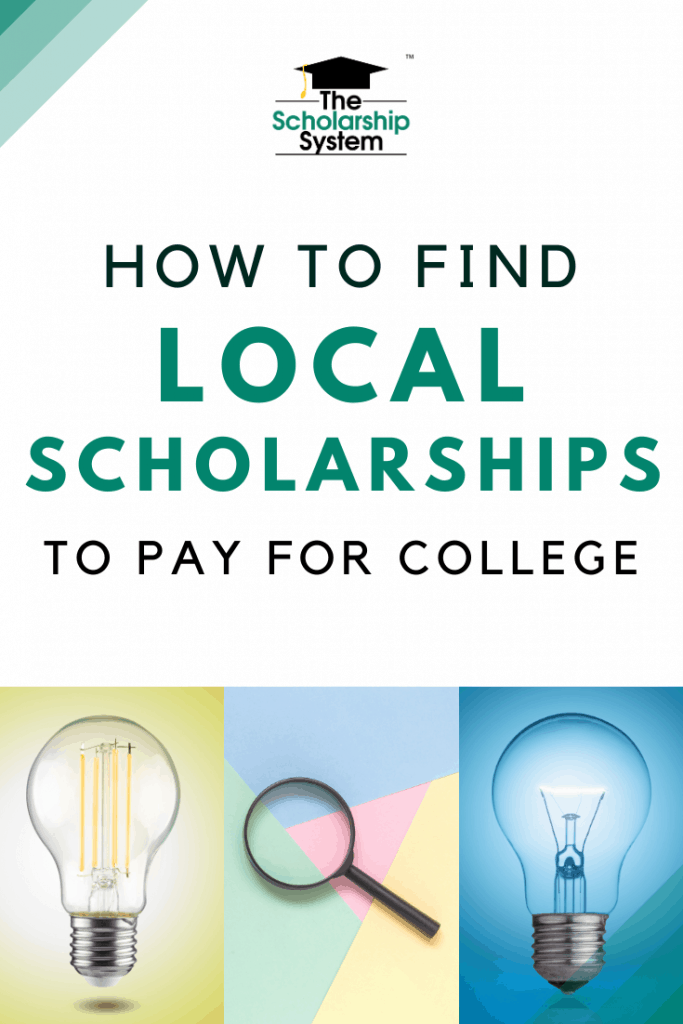Updated on September 11th, 2023
Local scholarships are a boon for students. Often, there’s less competition for the awards. This could make them easier to land, allowing students to bolster their funds and pay for college with greater ease. In some cases, they can even make a previously unaffordable school a real option.
That’s right; local scholarships can make a huge difference, as even small awards can add up to big savings. If you and your student want to learn more about where to find local scholarships, as well as national scholarships and awards! Sign up for our free college scholarship webinar! Take a trip over to http://thescholarshipsystem.com/freewebinar to reserve your spot today.
When you’re trying to figure out how to find local college scholarships, your approach matters. In many cases, local scholarship opportunities aren’t as well advertised, so you may have to actively track them down. Luckily, the process isn’t too difficult if you have a great scholarship search strategy.
If you’re ready to find local scholarships for college, here’s what you need to know.
Contents
How to Find Local Scholarships
Usually, when your student’s goal is to track down local scholarships and grants, your student will need to do some research. There are opportunities out there, so it is typically worth the effort.
While heading online and dropping some keywords into a search engine can certainly work – which should be part of their larger approach – other resources are usually much more valuable. If your student wants to know where they should start their search for local merit scholarships or other awards, here are some great options.
Where to Find Local Scholarships
High School Guidance Office
Many guidance offices are well aware of scholarships that are available in the local area, but it can be surprising how few students actually ask their guidance counselors about the opportunities. So, if your student hasn’t taken a few minutes to sit down with a guidance counselor, it is a stop worth making.
In fact, some school districts even have foundations that provide funds to their students, so make sure your high schooler asks about these opportunities during the meeting. This is one area where it never hurts to ask, as your student may be surprised by what they find.
Community Organizations
Not everyone knows that cities, towns, counties, and other municipalities may have community foundations within their borders that extend opportunities to local students. Your student can start the search by typing your city name and the words “community foundation” into a search engine and see what comes up.
In some cases, these foundations offer large awards and are limited to residents in the local area. Plus, they aren’t usually as well-known as some alternatives. As a result, there is typically far less competition for these scholarships than many others.
Local Chapters of Large Organizations
Many large, national organizations are divided into local chapters for easy management and community involvement. And many of these groups offer scholarships.
For example, your Elks Club or Rotary Club may have opportunities available to area students. Additionally, many local businesses or professional organizations that focus on your student’s desired field or area of study might offer scholarships. You can also check with the American Legion or VFW, especially if your family has a current or former military member.
As with community organizations, applications are normally only accepted from the local area they attend school. This means fewer students are competing for the funds, and the odds of being selected may increase.
Your student can search for professional organizations by entering the city’s name and their target field or major into a search engine along with phrases like “professional association.” That may help them find local chapters.
Local Businesses
Local community businesses may also have scholarship fund opportunities available for students. Anything from local utility companies, doctors’ and lawyers’ offices, banks or credit unions, and more may have funds available to support students.
Another source of local scholarships is entertainment sources. Area television and radio stations may offer scholarships, especially for students interested in entering the fields like broadcasting or journalism. In some cases, when these opportunities are available, they are limited to students in the viewing or listening target area, effectively making them local scholarships.
Parent’s Employer or Union
Certain employers and unions have scholarship opportunities only open to employees or members and their families. Depending on the program, this can make the pool of eligible applicants for scholarship programs fairly small.
However, some unions are indeed massive. Still, the number of applicants is limited, which makes these scholarships worth pursuing if your student or undergraduate degree qualifies.
City, County, and State Government
Local doesn’t just have to mean your student’s town. Technically, any scholarship or grant limited to students in a portion of the country could qualify.
For example, state-based programs can be considered local. With those, students usually have to be residents of a particular state to qualify. You can find opportunities limited to New York, Florida, Texas, or California students attending college, for instance.
However, you can also drill down further. Along with state programs, you might find opportunities at the city or county level.
Usually, the best place to start if your student wants to track down these various national and local scholarships and grants is through your area’s Department of Education or youth and family government agencies. Even if those organizations don’t host their own scholarships and grants, they may point you in the right direction.
Religious Centers
Many religious organizations offer scholarships to their members. If your family regularly attends services at a particular church, synagogue, mosque, or another religious facility, have your student ask the organization’s leadership if any funds are set aside for high education.
Even if scholarships aren’t available at the local level, the center’s leadership may know about other opportunities, too. That makes asking worthwhile.
Area College Websites
Local colleges provide a wealth of information to students, some of which benefits anyone heading to college, even if they aren’t planning to attend that specific school. One example is web pages on a community college’s website that focus on scholarships.
Many universities want to help students find the funds they need to cover the cost of their education. As a result, their scholarship lists can include local scholarships from various local companies and organizations. Plus, institutional awards directed at students attending the school do technically qualify as local scholarships, too, so keep that in mind.
Local Newspapers
In many cases, local newspapers will cover information about scholarships available in the area. Some businesses may place ads that showcase a scholarship they’re offering. Sometimes, a nearby reporter may even write an article about an organization’s efforts to make college more affordable to local students. As a result, it’s wise to check out local newspapers to find information.
While students could peruse the local paper if one is delivered to their house, most newspapers have an online component. By heading to that site, college students can find opportunities more efficiently. The majority of newspaper sites have a search bar, allowing students to look for the term “scholarship” and find recent articles, giving them information about nearby organizations that are potentially accepting scholarship applications now or might be offering scholarships in the future.
Social Media
Social media is an excellent resource for discovering local happenings, including scholarships targeting students in a specific city, county, or state. Many organizations will announce their scholarships on their profiles through posts, which could help your student find one or more scholarships or opportunities.
Additionally, any post that discusses award recipients shows that the entity sometimes provides scholarships. Even if the current one is closed, students can follow the page to see if a new one gets offered.
With this option, students shouldn’t focus solely on popular social media platforms with their age group. Instead, they may want to try options like Facebook or LinkedIn, as those are often more popular with businesses. However, that doesn’t mean they shouldn’t check Twitter, Instagram, YouTube, or TikTok, too, as many organizations use those platforms.
Anywhere Else
Essentially, any group in your local area might offer a scholarship, including sports teams, artistic groups, and many other types of organizations, collectives, or entities. Sometimes, the only way to find out is to ask. When it comes down to it, the risk associated with asking is just being told nothing is available. And, in the best case, your student may find out about a little-known opportunity that can help them get ahead.
How to Apply for Local Scholarships
As with all scholarship opportunities, your student needs to be strategic about how they apply for and win local scholarships and scholarship opportunities. Ideally, as many scholarships go, your student should start with awards they’re eligible to land with the smallest pool of qualifying applicants. This can limit competition dramatically, increasing their odds of winning.
After that, your student should branch out, expanding their search to those that are less stringent one step at a time. For example, your student may want to begin with small local scholarships that are only open to city residents, company employees and their families, graduates from a specific high school or district, or members of a particular organization. Institutional awards may also have a limited number of scholarship candidates, as only students that attend that college are eligible to apply.
Then, they could look for county-level, union, viewing/listening area, and similar, slightly broader options. After that, shift to scholarships open to students throughout the state, followed by opportunities that limit applicants to specific regions of the country. Then, they just continue to expand out one level at a time.
Additionally, it’s wise to examine scholarships that limit applicant pools in other ways. For example, major-specific awards – like STEM scholarships or art scholarships – may not have as much competition as those that aren’t limited to a field of study. Those that target particular demographics – like scholarships for African Americans or scholarships for women – may also have smaller applicant pools. As a result, students may want to focus their energies there before branching out into large national awards without many restrictions.
Should You Skip National Awards and Only Apply to Local Scholarships?
No, students shouldn’t skip out on national (or international) awards and solely focus on winning local scholarships for college. Instead, local scholarships should be part of the overall plan for college education.
Ideally, your student needs to concentrate on scholarships where they are a great candidate. If your student isn’t fully eligible for an award, that’s when they should bypass it. Otherwise, they shouldn’t skip out on a scholarship they qualify for just because it’s a national opportunity.
While they may want to start with local scholarships and grants because their odds of winning may be higher, once they tackle those, they should embrace national opportunities too. It never hurts to toss their hat in the ring, even if competition may be fierce. After all, someone has to win, and if they are qualified, that winner could be them.
That’s right; local scholarships can make a huge difference, as even small awards can add up to big savings. If you and your student want to learn more about where to find local scholarships, as well as national awards, sign up for our free college scholarship webinar! Take a trip over to http://thescholarshipsystem.com/freewebinar to reserve your spot today.








Leave a Reply